Growing HOPE


Helping farmers and families create food security
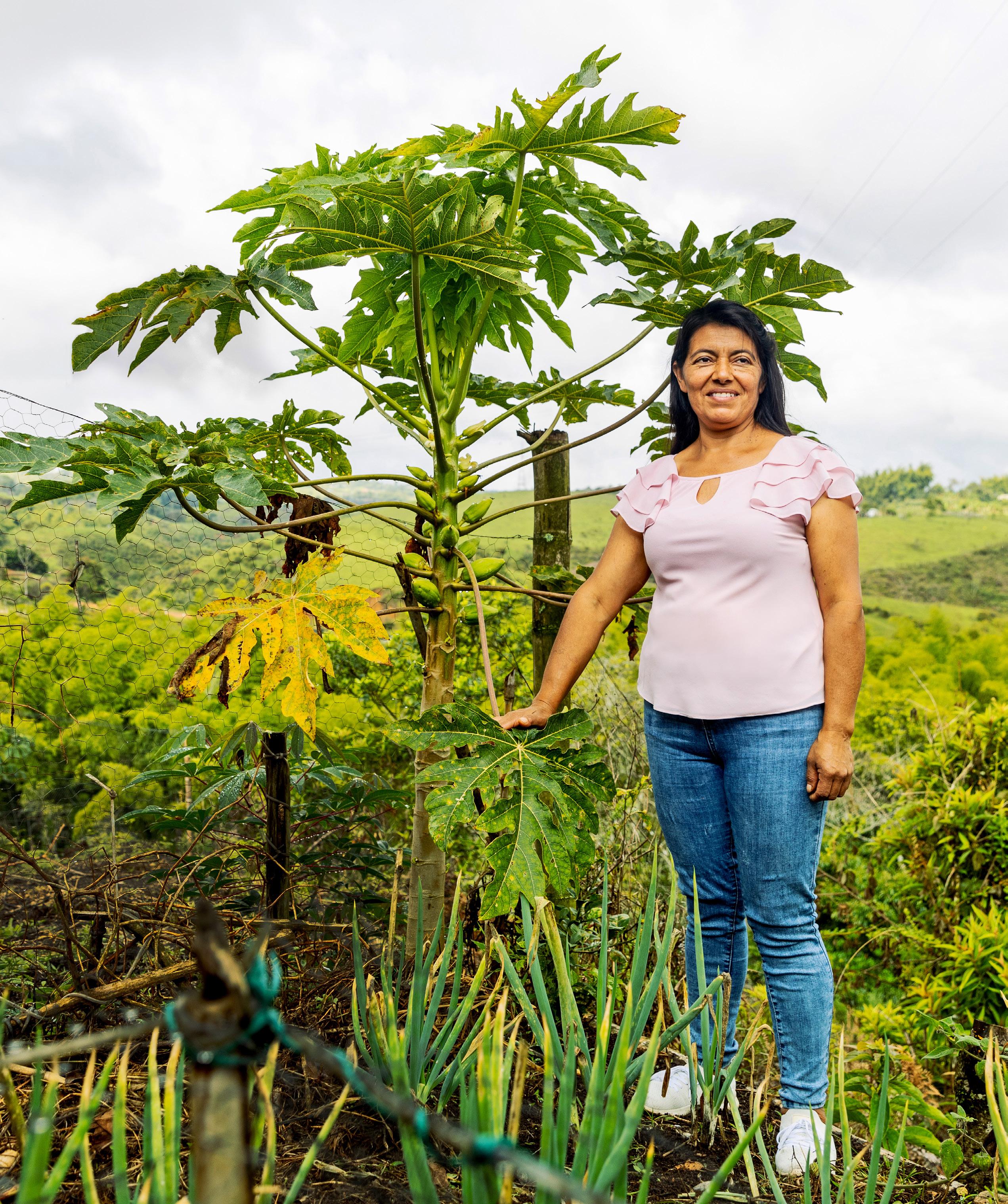
FARMERS HARVEST FOR CONVOY P. 4
COMMUNITY ENGAGEMENT P. 18
DR. DIRT P. 24
1
THE BEST SOLUTIONS ARE
grown AT HOME.

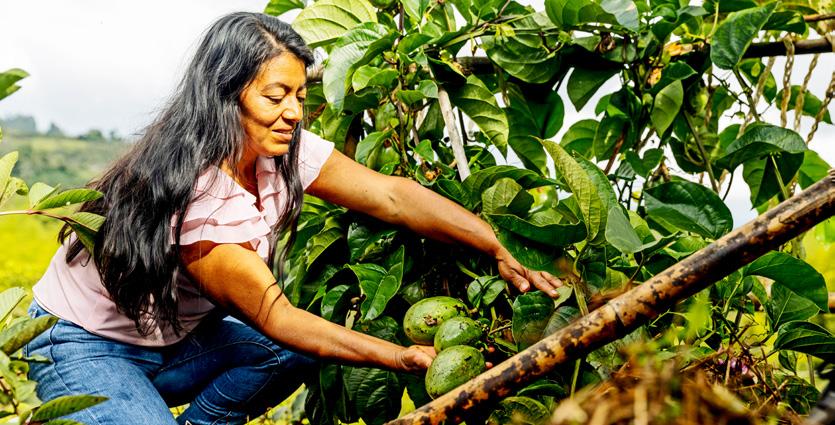
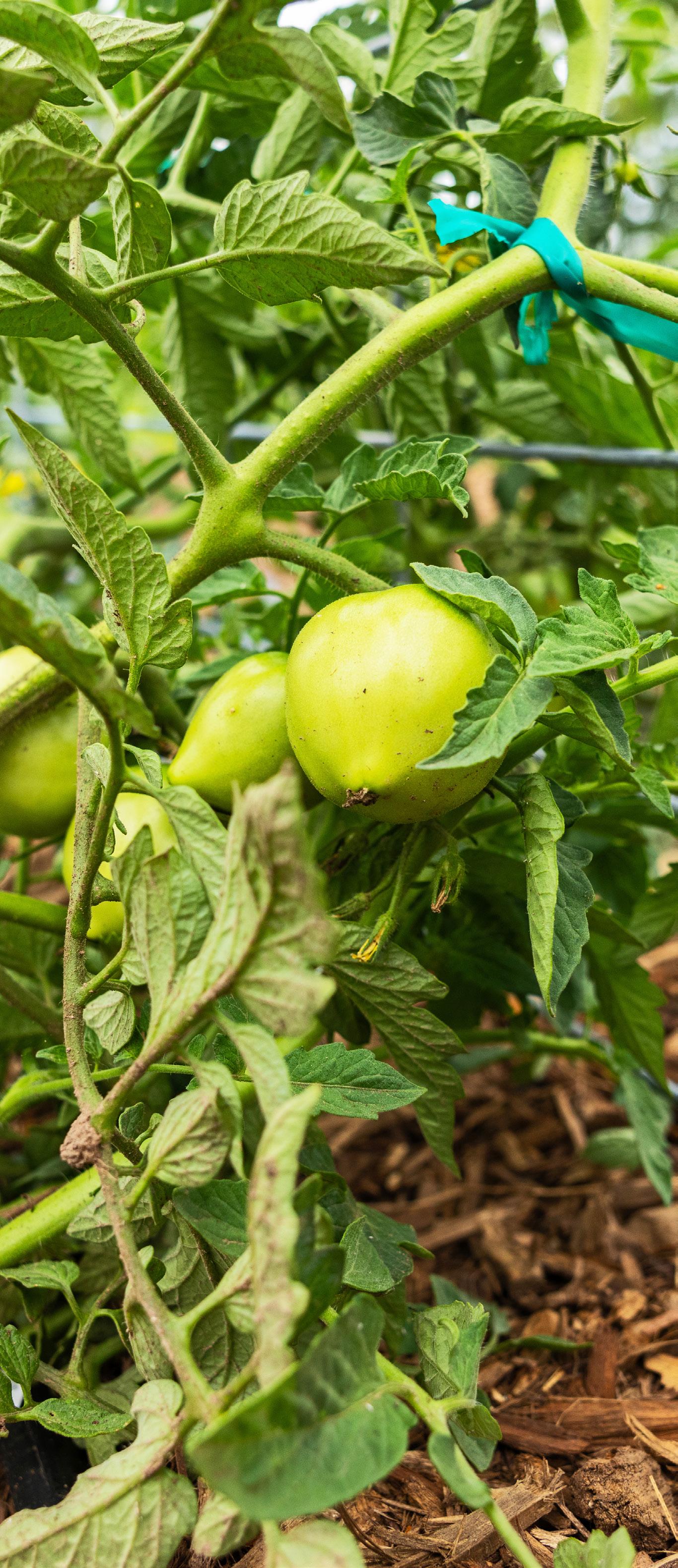
2 Convoy News Sustainable Communities On the Map Learn About Convoy Q&A FYI Growing Community 4 14 16 22 24 26 27 Growing Hope Helping farmers and families grow food is a proven strategy for combatting hunger and poverty. Community Engagement Churches and corporations are partnering together to meet needs. 8 18
Contents
1 Convoy Drive, Springfield, MO 65802
Hope Quarterly is published by Convoy of Hope.
Published: Fall 2023
©2023 Convoy of Hope
Editor-in-Chief | Roger Flessing
Editor | Scott Harrup
Managing Editor | Lindsay Donaldson-Kring
Content Editors | Levi Costello, Annie Denney, Alyssa Everett & Morgan Mills
Reporters | Levi Costello, Annie Denney, India Garrish & Jess Heugel
Photographers | Clayton Gilligan, Jess Heugel, Christian Lamb, Joe Mason, Simen Reinemo & Dylan Stine
Acres HOPE of
Growing up in California, I often traveled along fertile fields and orchards. One third of vegetables in the U.S. and threequarters of the nation’s nuts and fruits are grown in California.
Webmaster | Jess Heugel
Creative Director | Josh Carter
Designers | Aaron Davis, Leah Kiser & Misty Olivera
Board of Directors
Dr. Aaron Cole, Court Durkalski, Telvin Jeffries, Dr. Brad Trask, Dominick Garcia, Lindsay Howard, Dr. Sam Huddleston, Randy Hurst, Cheryl Jamison, Klayton Ko, Kay Logsdon, Rich Nathan, Tom Rankin, Sherilynn Tounger, Kirk Yamaguchi & Hal Donaldson (President)
Feedback | editor@convoyofhope.org
Website | convoyofhope.org
Twitter | @convoyofhope
Facebook | /convoyofhope
Postmaster | Send address changes to: Hope Quarterly 1 Convoy Drive, Springfield, MO 65802
I have also visited countries where hard-working farmers and gardeners struggle to provide for their families. When facing droughts year after year, many are forced to leave their homes and seek refuge in cities and camps.
Convoy of Hope’s Agriculture initiative is helping struggling families move beyond subsistence to full sustainability. Convoy’s agriculture specialists are coming alongside farmers and gardeners to help them expand their crops and increase food security.
You may not be planting seeds and harvesting fields around the world, but please know you are making it possible. Your generosity is feeding families around the world.
On the Cover: Carla, a participant in Convoy of Hope's Agriculture program in Colombia, inspects her harvest.
Gratefully,
Hal Donaldson President, Convoy of Hope
Some names and photos in this publication represent people who need to remain anonymous.
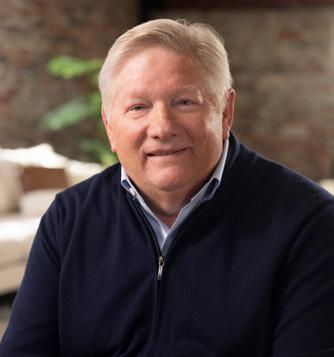
3
FALL 2023
FROM THE PRESIDENT
Farmers HARVEST FOR CONVOY
In Guatemala, nearly half the children under the age of 5 face stunting from malnutrition. South Dakota farmer Joe Warner discovered the difference that a truckload of pinto beans could make for children in Guatemala.
“You get eight meals out of a pound, so 1,000 pounds is 8,000 meals,” Joe says. “Being able to track it and know where it goes has been pretty amazing.”
Working with Convoy of Hope, Joe’s donations of commodities have also reached children in Africa, Mexico, and Haiti. His donations represent 20,000 meals.
More than 3.3 million meals were donated last year by farmers and agriculture corporations across the United States.
This year, North Dakota farmer Jeff Eebel and the Northarvest Bean Growers Association have provided 80,000 meals in pinto bean donations. Other farmers in North Dakota, South Dakota, and Montana have committed to additional donations of beans, peas, and corn from their harvests.
As Convoy of Hope continues to expand its Children’s Feeding initiative globally, U.S. farmers continue to play a key role.

4 CONVOYNEWS
Are you a farmer or part of a farming cooperative interested in donating bulk commodities to feed the hungry? Email Ashley Jonas at ajonas@convoyofhope.org.
Joe Warner has leveraged his farming expertise to help children in need.
Ukraine Response PROVIDES NEW HOPE
It’s been more than a year since the start of the war in Ukraine. The crisis is increasing, and Ukrainians in and outside the country are still suffering. An estimated 11 million people in Ukraine are considered food insecure.
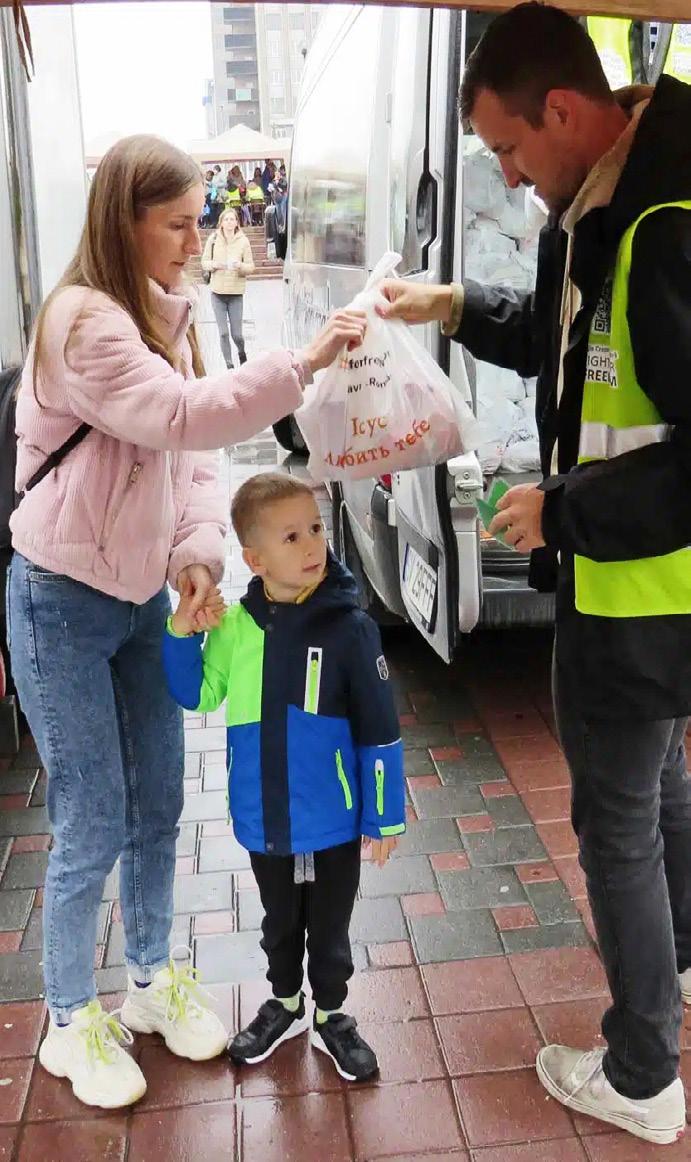
Convoy of Hope continues to provide help and relief. More than 450 containers (each holding up to 20 tons of cargo) have been shipped to the region, and nearly 4 million people have received relief in the form of food, water, baby care supplies, and more.
Additionally, through partnership with Champion Power Equipment, Convoy has sent more than 1,200 generators to families in need. Generators are crucial in providing power during rolling blackouts caused by damaged infrastructure.

On June 7, the Kakhovka hydroelectric dam collapsed and emptied into the Dnipro River
in southern Ukraine, flooding homes and stranding hundreds of people on top of roofs. With the flooding from the dam break, tens of thousands of people are deprived of clean drinking water and adequate shelter. The floodwaters ruined crops, displaced land mines, and set the stage for even more long-term electricity shortages.
The flooding adds another layer of devastation for an already vulnerable population. Convoy of Hope’s partners in the area estimate that more than 80 communities are flooded as a result. Convoy is responding with loads of emergency supplies and remains committed to providing long-term relief.
5
CONVOY NEWS
Available in FRENCH & SPANISH

How do you say “hope” in French?
“L’espoir.” Convoy of Hope’s website, convoyofhope.org, is now available in English, Spanish, and French.

When users open Convoy’s homepage, the language choice box in the bottom left corner can switch the content between those languages with a click.
“Our web team has been working diligently to create these options, and we’re happy to make Convoy’s online resources available across the French-speaking and Spanish-speaking worlds,” says Roger Flessing, senior vice president and chief marketing and communications officer.
Those demographics represent about 785 million people globally.
Convoy of Hope PROVIDES RELIEF IN SUDAN S

ince mid-April, fighting between Sudanese Armed Forces and paramilitary Rapid Support Forces has continued in Khartoum, with clashes occurring in Darfur and other areas in Sudan. Hundreds have been killed and thousands injured. More than 3 million people are now displaced by the conflict. Access to food and essential supplies is dwindling. Half the children in Sudan need urgent humanitarian assistance.
Convoy of Hope is one of the few nongovernmental organizations able to send resources to Sudan. During Convoy’s first round of distributions, 300 families received blends of fortified rice to help sustain them amid the conflict. Convoy of Hope will continue to work with partners in the area to distribute vital relief supplies to people affected by the violence.
6 CONVOYNEWS
CONVOY NEWS
Click this box in the bottom left corner of the screen.
Serving in NORTHERN KENYA
The Turkana region in northern Kenya is one of the driest in the country. For many years, drought has increased food insecurity. Recently, more than 300 residents in Locheresekon village gathered to receive several tons of fortified rice-and-lentil blends provided by Convoy of Hope. Convoy team members taught families how to cook the food properly to maximize its nutritional value.

Volunteers
Recognized WITH KEY AWARD
Randy and Dianne Senica received the Convoy of Hope Key Award for demonstrating outstanding volunteer service. The Senicas have served at disaster responses across the U.S., and last year they went to Poland as part of Convoy’s outreach to Ukrainian
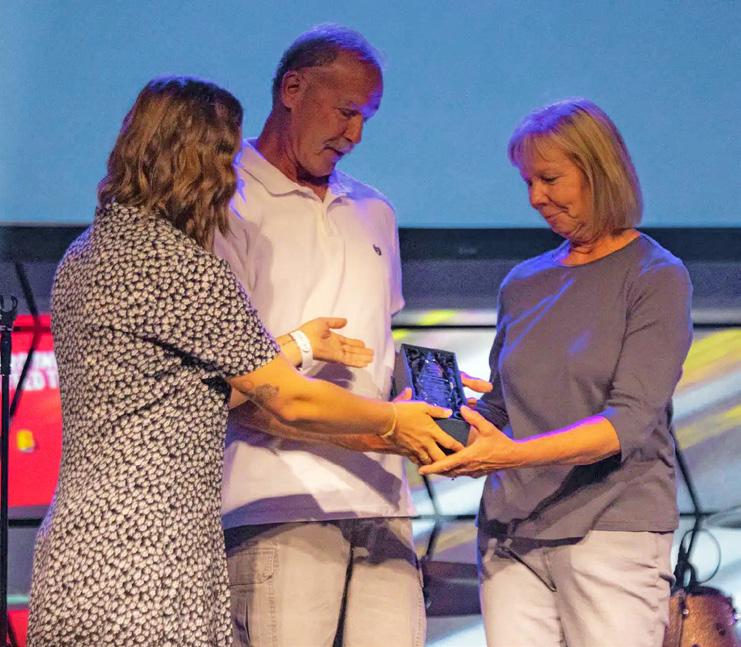
war refugees. The Key Award is named for Matt Key, Convoy of Hope’s first graphic designer.

7 CONVOYNEWS
TConvoy of Hope is sending food to Kenyan villages during a severe drought.
Randy and Dianne Senica accept the 2023 Convoy of Hope Key Award.
Carla and other farmers in Colombia are part of Convoy of Hope’s global Agriculture program.


8 8 FEATURE
HOPE Growing
Helping farmers and families create food security
 BY KEVIN ROSE
BY KEVIN ROSE

9 9 FEATURE
Standing on a second-floor balcony, I had no idea what was coming. When the earthquake hit, I raced out to the street. I was grateful to be alive. The death toll has never been firmly established, but it certainly crested 100,000 people.
The 2010 Haiti earthquake became a testing ground for Convoy of Hope’s long-term response to community needs. One of the powerful lessons learned in the following months was the role that agriculture training can play as a route to overcoming poverty and providing food security for families and entire communities.
Dr. Jason Streubel leads Convoy’s Center for Agriculture & Food Security (see his interview on page 24).
In 2011, he organized Convoy’s first sustainable agriculture project in Haiti. He and his team trained local farmers in agriculture methods that helped them achieve increased yields to their crops in ways that kept costs low while protecting environmental and human health.
Convoy of Hope’s Agriculture initiative soon expanded from Haiti. In 2022, our global
Agriculture team trained more than 25,000 participants around the world. By 2030, the goal is to train 100,000 in agriculture each year.
But, at Convoy, the big numbers always translate into individual people whose lives have been changed: People like Reina in El Salvador, where Convoy melds Women’s Empowerment with Agriculture. Reina has experienced great success in her own business and is now helping other women too. Participants receive a feeder, equipment to build a coop, training in the care and medication of chickens, and a starter group of 15 hens.
Reina has grown her business to more than 550 hens. “I didn’t think I could ever do this,” she said. “But Convoy of Hope came alongside me and encouraged me.”
In Tanzania, Convoy helped a school create a massive garden. It’s about the size of a football field. When our team visited this spring, students stood near
continued on p. 12
10 FEATURE
Port-au-Prince, Haiti. January 12, 2010. A little before 5 p.m.
CONVOYNEWS
An Agriculture participant in the Philippines has a thriving poultry business thanks to Convoy of Hope’s training and support.

FEATURE
the different vegetable beds. Every child gave a presentation. “This is kale,” one student said with a smile. “Kale has vitamin D in it.”
The students were eager to be involved in gardening clubs and to share about the benefits of their vegetables. Their families’ diets have greatly improved because of what they have learned.
In Nicaragua, we visited a citrus farm. Maria Antonia and her son, both longtime farmers, experienced drought, which stunted their crops of corn and beans. Convoy of Hope’s agricultural specialists work alongside farmers to determine what they know and what they’ve already tried. The best results happen when farmers and Convoy’s specialists work together to find creative solutions.
“We’ve always been interested in growing citrus,” Maria Antonia said. She and her son had been reluctant to take the risk of changing their entire field from row crops to citrus.
But Convoy provided seedlings and training support. As a result, today they are completely sustaining themselves and increasing the food security of their community. Maria’s story is being repeated around the world.
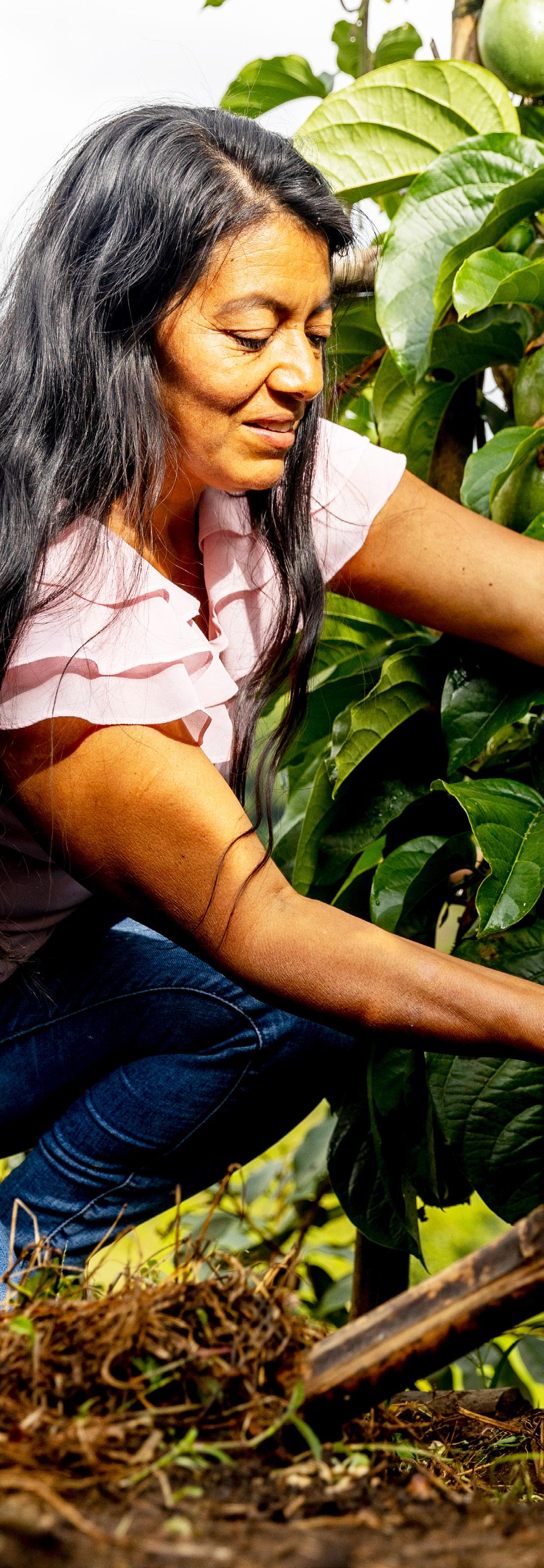
12
FEATURE
SCAN HERE for some ideas on preserving the food you grow.
Ongoing research at Convoy of Hope’s Center for Agriculture & Food Security reduces the risk farmers face around the world. As Convoy’s agriculture experts identify strategies to increase crops in different global environments, they can pass along proven techniques to Agriculture initiative participants.
Did you know that Convoy helps farmers with dozens of unique solutions, including beekeeping? In Nicaragua, Convoy is helping a local pastor with bee farming, which is providing a unique but profitable income for his family.
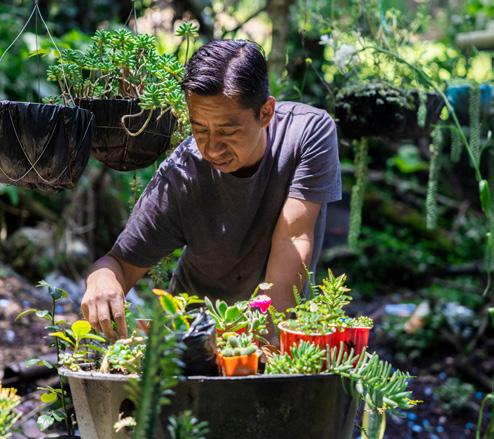

Human dignity is one of Convoy of Hope’s core values. We believe that Agriculture is an incredible way to provide solutions to families while honoring their dignity.

SCAN HERE for tips on evaluating your garden’s soil type.
SCAN HERE to learn how you can make safe organic pesticides.
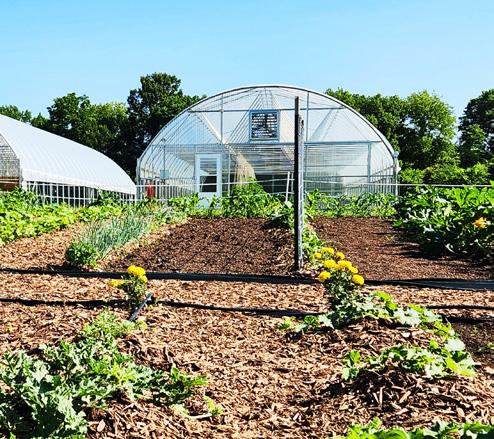
13
FEATURE
13
Philippines



15 CT INFORMATION State Thank you for your . All gifts are tax-deductible as BECOME A MONTHLY DONOR Check $25 $50 Please make checks payable to: MAKE A DONATION P.O. Box 1125 Springfield, MO 65801 HQ0831 ZIP Stocks Property Iʼd like to include Convoy of Hope in my estate plans. I would like to receive mobile updates from Convoy of Hope.* I would like to learn more about planned giving and Hope Society. *Message frequency may vary. Message & Data rates may apply. Reply STOP to 68828 to cancel. Donate online at convoy.org/hq31 To donate by credit card, convoy.org/hq31 or scan here with your smartphone. Philippines
Cities
in Need
Convoy of Hope’s community engagement team is working hard to create opportunities for families and individuals to encounter hope across the United States. The team’s research has identified the most vulnerable and impoverished communities across the country. With the help of local partners, Convoy of Hope is aiming to serve 30 cities over the next three years. The goal is to see the cycle of poverty broken for tens of thousands of families.
13. Seattle, Washington
14. Oklahoma City, Oklahoma
15. Albuquerque, New Mexico
16. Brownsville, Texas

















17. Raleigh-Durham, North Carolina
18.
Milwaukee, Wisconsin
16 ON THE MAP
1. Atlanta, Georgia
2. Washington, D.C.
3. New York City, New York
4. Los Angeles, California
5. Boise, Idaho
NEW MEXICO ARIZONA CALIFORNIA NEVADA IDAHO WASHINGTON
27 15 29 26 23 30 4 5 13 HAWAII
6. Honolulu, Hawaii
6
30
7. St. Louis, Missouri
8. Syracuse, New York
9. New Haven, Connecticut
10. Miami, Florida
11. Chicago, Illinois
12. Detroit, Michigan
16


















17 ON THE MAP NEW YORK TEXAS OKLAHOMA MINNESOTA MISSOURI ILLINOIS WISCONSIN MICHIGAN OHIO INDIANA ALABAMA GEORGIA FLORIDA CONNECTICUT NORTH CAROLINA WASHINGTON, D.C. 20 18 11 7 28 12 21 25 19 3 8 9 2 17 1 22 14 24 16 10 19. Rochester, New York 20. Minneapolis, Minnesota 21. Toledo, Ohio 25. Cincinnati, Ohio 26. Las Vegas, Nevada 27. El Paso, Texas
Birmingham, Alabama
Stockton, California
Houston, Texas
Indianapolis, Indiana
Phoenix, Arizona
Sacramento, California
22.
23.
24.
28.
29.
30.
Community ENGAGEMENT
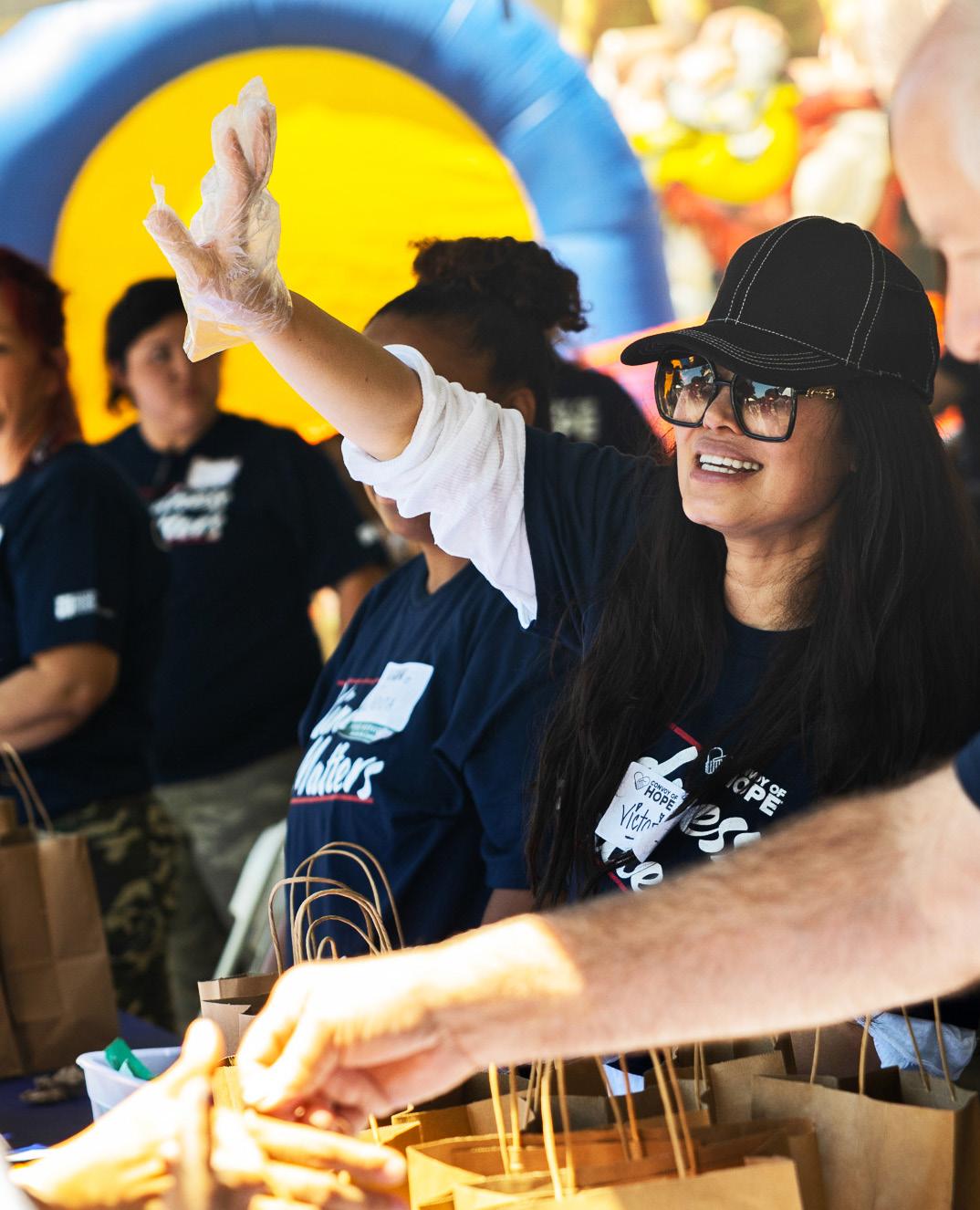
18
ENGAGEMENT
(San Jose, California) Convoy of Hope is working with partners to serve communities in need.

Meeting needs, multiplying hope
BY NICK WIERSMA
Convoy of Hope is about serving families and communities. From its inception, community outreaches across the U.S. have connected Guests of Honor with free resources — groceries, backpacks and shoes for schoolkids, job counseling, haircuts, family photos, and more. In addition, by training and resourcing rural churches, our Rural Initiatives teams provide solutions to challenges faced by small towns. And, our Field Teams groups reach out to communities around the globe through local service projects.
Partners like Christ Fellowship Church in Palm Beach Gardens, Florida, have made serving their community a priority. Convoy of Hope and Christ Fellowship have worked together for years to respond to disasters and meet local needs. When Hurricane Michael wreaked havoc nearby in 2018, for example, Christ Fellowship established Operation Sister City.
19
19
FEATURE
With Convoy’s help, they served emergency staff and survivors in a neighboring community.
According to the church’s outreach director, Becky Kyle, that response opened many other doors for Christ Fellowship to serve their community. This past year, the Palm Beach Gardens City Council expressed their gratitude by recognizing Christ Fellowship as a beacon of hope across the entire region.
Through community engagement, Convoy of Hope is committed to meeting the needs of people, regardless of the size of the need or community.In the years following the pandemic’s spread, food insecurity remains a central need.
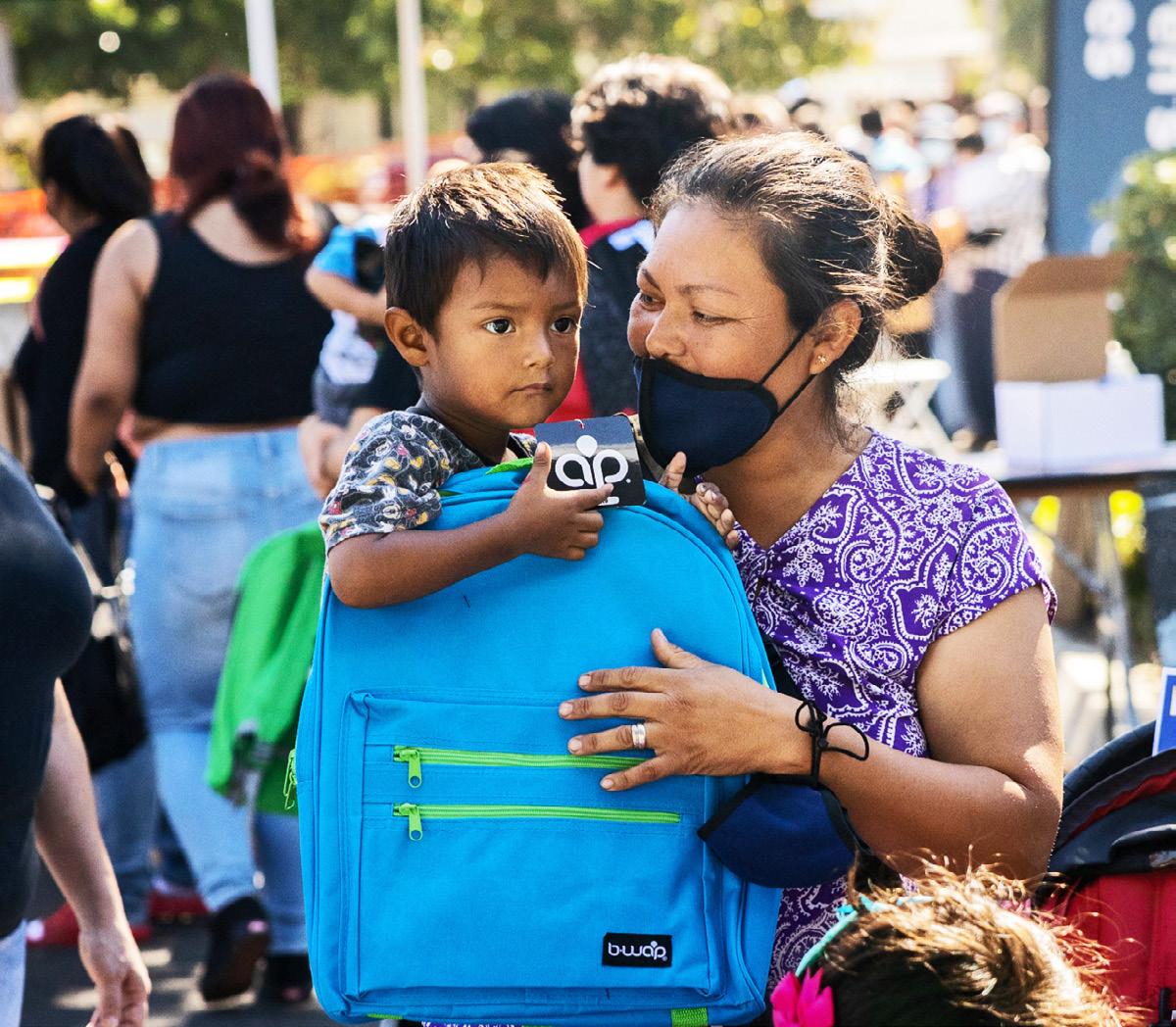
According to the U.S. Census Bureau, the number of Americans who say they
sometimes don’t have enough to eat jumped 23% — from 15.8 million before the pandemic to 19.2 million this May.
Catherine D’Amato, CEO of the Greater Boston Food Bank, recently told CBS MoneyWatch that 1 in 3 households with children in Massachusetts reports that their children were hungry or that the family recently skipped a meal. Greater Boston Food Bank’s research revealed some families are forced to make desperate choices, such as watering down baby formula or other food.
Convoy of Hope utilizes a vast network of church partners like Christ Fellowship and a host of local compassion-minded corporations to bring help and hope to communities. So far this year, 263 tractor-trailer loads — containing more than 5.6 million pounds of food, water,
20 20
The number of Americans who say they sometimes don’t have enough to eat has jumped 23%.
FEATURE
— U.S. Census Bureau
and other resources — have helped more than 426,000 people across more than 320 communities.

“We will continue to focus on this growing need in America,” says President Hal Donaldson. "Community engagement efforts are enabling us to partner with more churches and corporations every year to stem the tide of hunger.”

Convoy of Hope Is Fighting Hunger in America
5.6 MILLION+
POUNDS OF FOOD, WATER & OTHER RESOURCES DISTRIBUTED
426,000+
PEOPLE SERVED
320+
COMMUNITIES SERVED
263
TRACTOR-TRAILER LOADS DELIVERED

FEATURE (YTD
2023)
21
Volunteers prepare resources for a community distribution.
Disaster Services
Ukrainian war refugees, East African communities on the edge of famine, and U.S. hurricane survivors all have received critical help through Convoy of Hope’s Disaster Services team. Consistently among the first to respond to crises, Convoy’s highly trained staff and volunteers help hurting people get back on their feet. Convoy is committed to helping as much as possible for as long as possible in the most challenging environments.
Children’s Feeding

Approximately half of all deaths of children under 5 can be linked to undernutrition. A nutritious meal coupled with clean drinking water opens doors to better health and consistent physical and mental development. Convoy of Hope provides regular, nutritious meals in schools around the world. Now, more than 500,000 children are discovering renewed hope.

Agriculture

Convoy of Hope’s Agriculture program is equipping vulnerable farmers and families with skills, tools, and seeds to increase life-sustaining crops. Of the tens of thousands of meals harvested each year, a portion is used to support Convoy’s Children’s Feeding program. Convoy’s agriculture specialists teach long-term sustainable practices that help break the cycle of poverty and promote communitywide food security.
Women’s Empowerment
When a woman generates an income, it not only benefits her — the entire community profits. Through training and loving support, Convoy equips women to start and successfully operate their own businesses. Convoy encourages women and girls around the world to realize their value and reach their potential. This gives them the opportunity to positively impact the lives of their future families and their communities.

22
LEARN ABOUT CONVOY 22
Community Events
Since its founding in 1994, Convoy of Hope has worked with civic organizations, churches, businesses, and government agencies to create Community Events that bring help and hope to thousands in need. Each Guest of Honor receives needed resources and services, all free of charge. Convoy’s team works with dedicated local volunteers to deliver groceries, health services, family portraits, career services, children’s shoes, and much more.

Convoy of Hope Education™
By providing curricula and other resources to participating colleges, Convoy of Hope is preparing the next generation to address the world’s compelling challenges with help and hope. Please

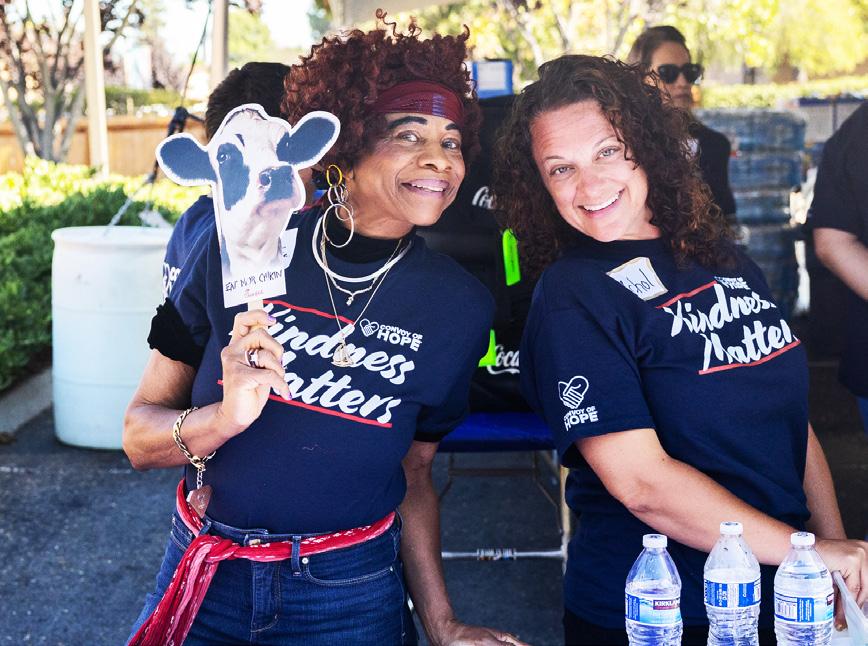
Rural Initiatives
Convoy of Hope reaches people exactly where they are. Poverty and hunger have gained a devastating edge in rural communities. By partnering with local churches to offer resources, training, mentoring, and coaching, Convoy of Hope helps people effectively discover and implement solutions to the issues in their local context. Convoy believes increased presence and partnership with local leaders help strengthen and enrich entire neighborhoods and towns.
23 LEARN ABOUT CONVOY 23
pray for those we serve.
Dr. Jason Streubel, known to many as “Dr. Dirt,” is senior director of Convoy of Hope’s Center for Agriculture & Food Security (CAFS). The CAFS team and volunteers are researching, demonstrating, and innovating best practices to improve harvests in food-challenged regions. Dr. Streubel recently visited with Hope Quarterly.
A
Dr. Jason STREUBEL

HQ: When did your life begin to intersect with agriculture?
Jason: I grew up in the state of Washington. My grandfather had a cherry orchard, and I worked there during my childhood. I spent about 10 years on a nearby ranch working in animal husbandry.
Mount Baker High School is nationally known for its agriculture program, and that
interest continued when I earned my first bachelor’s degree at Northwest University in Kirkland, Washington. Even while I was pastoring a church, I knew God wanted me to help people grow the food they need. I went back to college for another bachelor’s in environmental science, then a master’s in general agriculture. I received my final degree at Washington State, a Ph.D. in soil science.
24
HQ: What is your primary area of research?
Jason: You can break soil science down into five areas. (1) How soil got here, which looks a little bit like geology, (2) what lives in it, which is soil microbiology, (3) the chemistry behind interactions, that’s soil chemistry, (4) how the water and nutrients and chemicals flow in soil, that’s soil physics, and then (5) soil fertility, which looks an awful lot like agronomy, the study of crops and soils. I’m a soil scientist whose specialty is soil fertility.
HQ: What led to your connection with Convoy of Hope?
Jason: I asked if Convoy could ever use an agriculture scientist, and we began to explore possibilities. I’ve now served at Convoy for 12 years. My first project was helping farmers improve their yields after the devastating earthquake of 2010 in Haiti.
HQ: How does Convoy’s Agriculture initiative contribute to its larger mission?
Jason: Everybody needs to eat. More than 500,000 children are engaged in Convoy’s Children’s Feeding programs. And if we do our job right, in the future they will be feeding their grandchildren. We want to build sustainable solutions. You have to address food from the ground up. And that’s from the soil all the way through manufacturing, production, and marketing. Every time we help someone grow more, increase efficiency on how they’re growing, help someone problem-solve in the field,
or give them the tools to problem-solve for themselves, we are working ourselves out of a job. When you invest in agriculture, you invest in feeding kids, families, and communities.
HQ: What is on the horizon?
Jason: If we look at where we were — me standing in a field in Haiti as a pilot experiment — we’ve grown to include agriculture officers in many of our program countries. They are local experts in their soil, pests, and crops. And they’re working with our Agriculture specialist team here at our Global Headquarters, which is growing exponentially. So, we will have even more experts on the ground working with individuals to “grow” sustainable hope.
As the Center for Agriculture & Food Security grows, we’ll be able to train, demonstrate, and resource in all areas of agriculture — from animal husbandry to carbon dynamics to agriculture mechanics. We will represent the world of agriculture from the plants of Missouri to Kenya. From barns to labs, this will be done to resource all who need it. Convoy wants to be training more than 100,000 farmers or individuals in agriculture annually by 2030 — from the mom in Maine to the father in Madagascar.
The amazing things I’ve seen Convoy do over the last 12 years in Agriculture still make me stop and catch my breath. But there are still people who are starving, who don’t know where their next meal is coming from. We want to help people — even here in America — discover the role a garden can play in their future.
25 Q&A
Why AGRICULTURE?
Check out how Convoy of Hope is using soil science to make a difference around the world.



HONDURAS
Gardening is a great activity for a Girls’ Empowerment group. Learning the best strategies for planting tomatoes is just one reason Rosa says her Girls’ Empowerment group is a shelter from the challenges of life. “The agriculture program has benefitted me and my family in healthy eating,” she says.
PHILIPPINES
The Ag567 project has proven popular. The name comes from the central strategy — encourage and train five or more neighbors to cooperatively grow six vegetables in a communal garden while rotating gardening tasks every seven days. Ag567 now involves 900 gardeners.
BULGARIA
Ukrainian refugee Stepan brought his family to Bulgaria when war broke out in his home country. Back home, he was involved in agriculture and animal husbandry. With Convoy of Hope team members’ help, Stepan’s family was soon raising livestock, growing crops, keeping bees, and successfully supporting themselves.
NEPAL
Mangale was struggling with debt when he jumped at the chance to be trained through Convoy of Hope’s Agriculture initiative. Making compost and expanding to different vegetable varieties resulted in sending 345 crates of tomatoes to his community’s main market.
UGANDA
Convoy agriculture experts offered a weeklong seminar teaching farmers sustainable crop strategies. A key point was showing growers the dangerous health risks of cassava, a traditional crop, and the great advantages of growing pigeon peas, a nutritious and safe vegetable.
NICARAGUA
Convoy of Hope set up “Manos Amigas” (“Helping Hands”) as a community garden where neighbors could learn proper agriculture practices, pest control, irrigation techniques, and how to run a produce business.
FYI
26
GROWING
COMMUNITY
ONE GARDEN AT A TIME
Convoy of Hope believes that the potential for lasting change is in the soil and that the best solutions are grown at home.
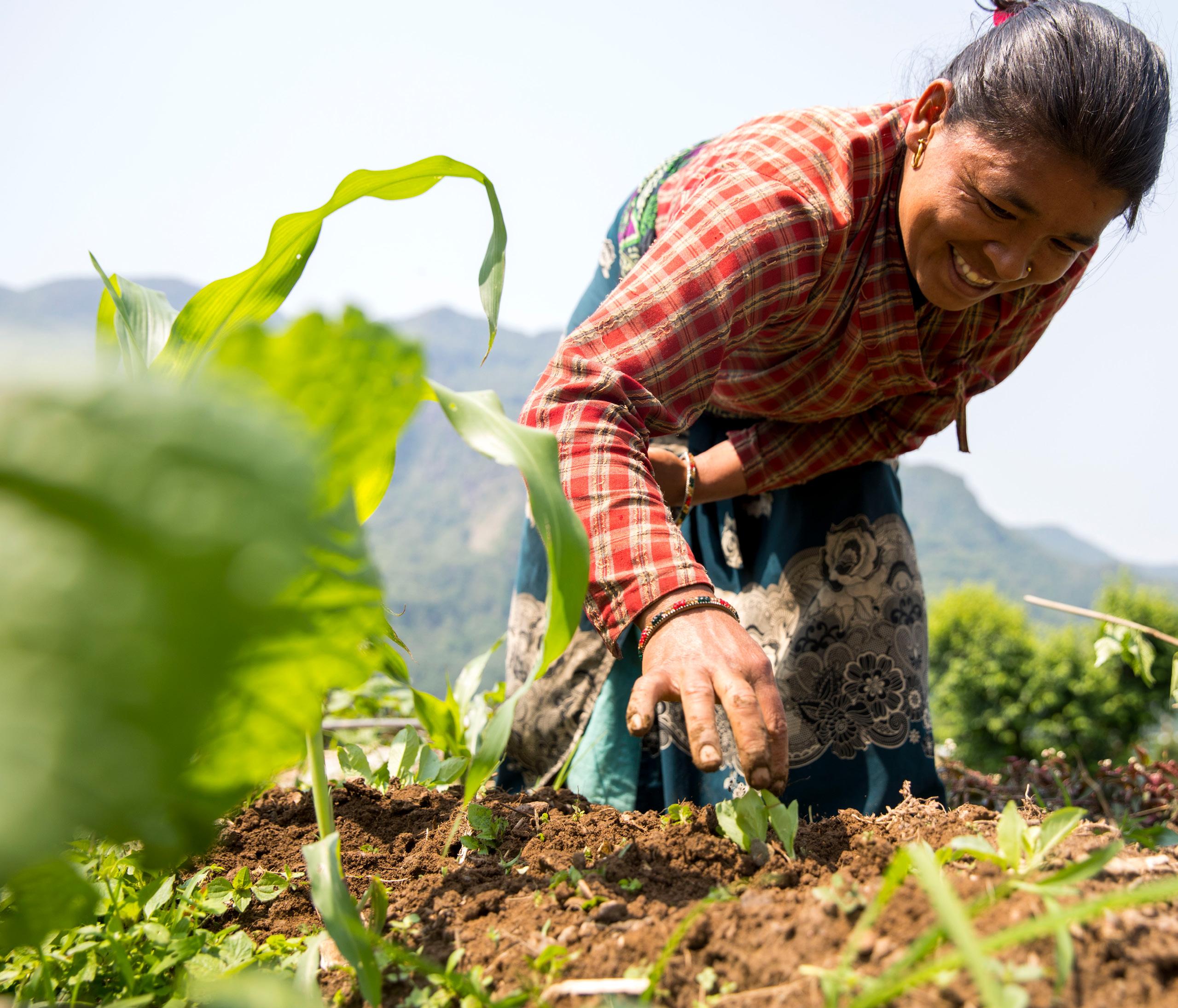
convoyofhope.org


27
27
Visit
Mail: 1 Convoy Drive
Springfield, MO 65802-2213
P: (417) 823-8998
F: (417) 823-8244
Donations: P.O. Box 1125
Springfield, MO 65801
John Doe Family 10203 West Phelps Cincinnati, OH 61210
You and your spouse or guest are cordially invited to the dedication of Convoy of Hope’s Global Headquarters & Training Center convoy.org/builtforhope

28
us
at:
online
convoyofhope.org



















 BY KEVIN ROSE
BY KEVIN ROSE






























































